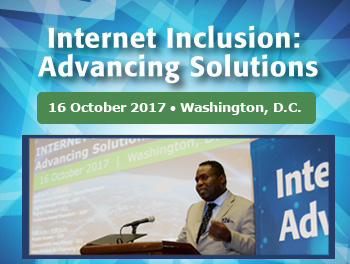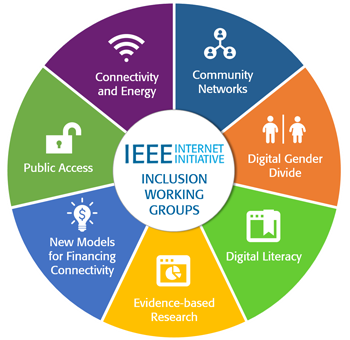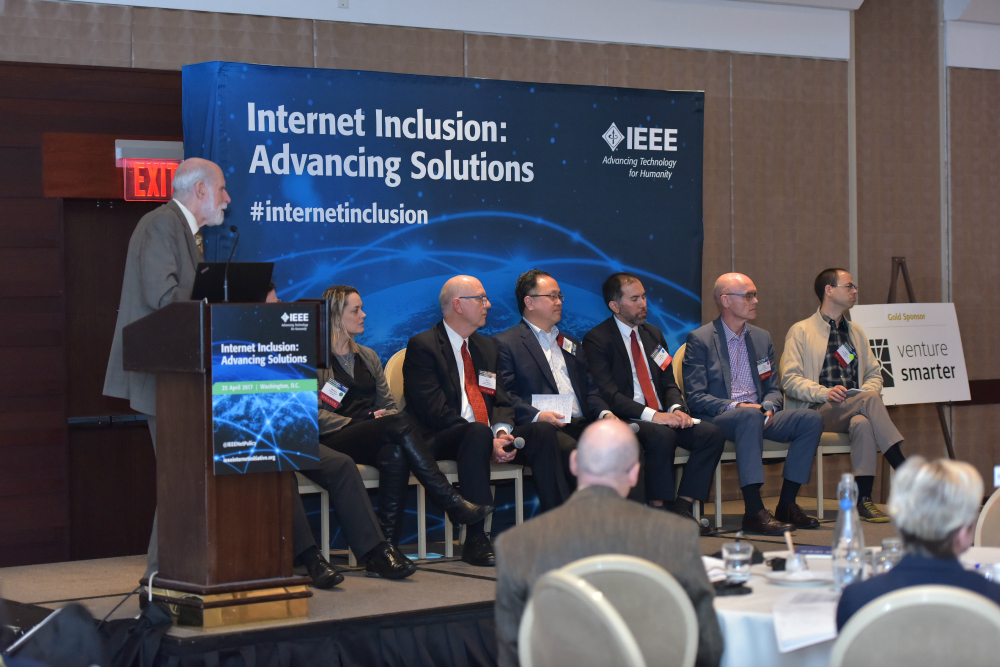Internet Inclusion: Advancing Solutions – 16 October 2017
 On 16 October 2017 at The George Washington University Cloyd Heck Marvin Center, Washington, D.C., IEEE held an Internet Inclusion: Advancing Solutions (IIAS) event. At this full-day meeting, seven IIAS working groups met to progress their work, share information, report on new developments, and work toward collective action for advancing solutions for internet inclusion that is affordable, meaningful, and sustainable. This event is part of IEEE’s overall internet inclusion series held around the world, including Washington, D.C., New Delhi, Tel Aviv, Geneva, Joao Passoa, Guadalajara, and Windhoek.
On 16 October 2017 at The George Washington University Cloyd Heck Marvin Center, Washington, D.C., IEEE held an Internet Inclusion: Advancing Solutions (IIAS) event. At this full-day meeting, seven IIAS working groups met to progress their work, share information, report on new developments, and work toward collective action for advancing solutions for internet inclusion that is affordable, meaningful, and sustainable. This event is part of IEEE’s overall internet inclusion series held around the world, including Washington, D.C., New Delhi, Tel Aviv, Geneva, Joao Passoa, Guadalajara, and Windhoek.
Seven working groups that met, included:
- Community Networks (Lead: Roger Baig Viñas, Guifi.net)
- Connectivity and Energy (Lead: Nilmini Rubin, Tetra Tech)
- Digital Gender Divide (Lead: Gary Fowlie, ITU)
- Digital Literacy (Leads: Melissa Sassi, Microsoft and Stephen Wyber, IFLA)
- Evidence-Based Research (Lead: Christopher Yoo, University of Pennsylvania)
- New Models for Financing Connectivity (Lead: John Garrity, USAID)
- Public Access (Lead: Don Means, Digital Village and P4PA)
An exclusive Roundtable Discussion on Advancing Solutions for Digital Inclusion included leaders from organizations overseeing internet inclusion efforts. An interactive roundtable with leaders of real-world internet inclusion projects discussed their project’s impact, what still may be needed to realize internet inclusion, and how to fill gaps identified.
For more information contact Victoria Kuperman-Super.
EVENT RESOURCES
Presentations
- Guy Zibi, Principal, Xalam Analytics, Multilateral Development Banks’ Investments in the ICT Sector
Internet Inclusion: Advancing Solutions Twitter moment
IEEE.tv event showcase with select session recordings
RELATED ARTICLES
“Opinion: Internet inclusion is meaningless without digital literacy” by Melissa Sassi and Stephen Wyber | Devex (January 2018)
“How to achieve internet for all: What we learned in 2017” by Catherine Cheney | Devex (December 2017)
“IEEE Series Aims to Advance Internet Inclusion Worldwide” by Karen McCabe | The Institute (November 2017)
“Advancing Internet Inclusion Q&A: IEEE working group leaders share points toward progress” by Karen McCabe | IEEE Internet Initiative (October 2017)
PROGRAM OVERVIEW
| Start Time | End Time | Agenda |
| 8:00 a.m. | 8:45 a.m. | Breakfast and check-in |
| 9:00 a.m. | 9:05 a.m. | * Welcoming remarks |
| 9:10 a.m. | 10:10 a.m. | * Advancing solutions for Digital Inclusion Roundtable At this Roundtable, prominent leaders will discuss the concept of a digital inclusion strategy and dive into questions. |
| 10:15 a.m. | 10:45 a.m. | * Are Investments in the ICT Sector a Priority for Multilateral Development Banks? Findings from the Working Group on Multilateral Development Banks (WG-MDBs) Research Project The WG-MDBs Investment Strategies in the ICT Sector, lead by the Alliance for Affordable Internet and the Web Foundation, will share the findings and initial recommendations of a new research project. |
| 10:45 a.m. | 11:00 a.m. | Coffee Break |
| 11:00 a.m. | 12:00 p.m. | * Profile Project Roundtable Leaders of real-world impact initiatives and projects for meaningful internet inclusion will share their first-hand experiences of what is working and what is still needed for impactful and sustainable internet inclusion--and how to fill the gaps identified. |
| 12:00 p.m. | 1:00 p.m. | Lunch |
| 1:15 p.m. | 2:45 p.m. | Working Groups: Session One |
| 2:45 p.m. | 3:00 p.m. | Coffee Break |
| 3:00 p.m. | 4:30 p.m. | Working Groups: Session Two |
| 4:30 p.m. | 5:00 p.m. | * Working Group Report Outs and Closing Remarks |
| 5:00 p.m. | 5:45 p.m. | Working Group Leads Sync Up |
| 6:00 p.m. | 8:00 p.m. | Networking Social Reception: Westin Georgetown |
* Recorded sessions available soon on IEEE.tv.

INTERNET INCLUSION WORKING GROUPS
Public Access Working Group
This working group’s focus is universal internet inclusion through public access (PA), and it is dedicated to the proposition that any realistic strategy to meaningfully connect and enable the next billion(s) must have a PA component. Connecting libraries and other PA facilities is the most economical and equitable way to reach the greatest number of people, with the potential to add value as training and support for digital literacy.
New Models for Financing Connectivity Working Group
Combining the financing focus from the previous meeting's Innovative Business Models group along with the World Economic Forum's Internet for All Financing New Models for Connectivity, this working group will continue progress on activities to close the pervasive financing gap for digital infrastructure projects. The group is focusing on identifying and sharing investment opportunities, tracking current investment vehicles (and where investment gaps exist), and encouraging new sources of funding, particularly social impact investment.
Digital Gender Divide Working Group
This working group focuses on identifying approaches to build and optimally use programs and successfully scale activities to bridge the gender digital divide, focusing on access to ensure equality in women’s access to and use of the internet. It works to address the challenges and opportunities regarding women and meaningful internet access through the development of action-oriented recommendations and best practices that can be deployed to foster the equal inclusion of women and girls in internet access.
Evidence-based Research Working Group
Significant resources are invested into plans and projects that are designed to connect the billions of people who still lack any sort of digital connectivity. Yet, it is surprising that there is a relatively sparse evidence-base about how greater access and connectivity can facilitate or enable various types of economic and social development. This working group brings together diverse groups ranging from the technical community to the development community that are working on parallel issues of meaningful and sustainable internet access so that they can tap into the robust research tradition that measures the social impact of interventions for internet access and development in terms of health, education, agriculture and gender empowerment. Its goal is to produce outcome metrics that will better target Information and Communications Technologies for Development efforts through the power of data.
Community Networks Working Group
Community Networks (CNs) are acknowledged drivers for a truly empowering internet inclusion, as they imply the involvement of the communities in the design, construction, maintenance, and operation of their own telecommunications infrastructure. Fostering their adoption poses an excellent opportunity for contributing to connect the next billion(s). This working group focuses on identifying and addressing the key challenges for this adoption and welcomes participants with all kinds of skills and expertise in order to guarantee impactful discussion and outcomes for adoption and use.
Digital Literacy Working Group
The Digital Literacy Working Group considers the role of the libraries and other community centers as hubs for digital literacy for individuals and for building resilience in communities to improve safety and security through education and learning. The working group is addressing various aspects of digital literacy that can expand opportunities, reduce risks, overcome obstacles and address challenges through working toward a common global definition of digital literacy, a digital literacy taxonomy, and digital literacy index.
Energy and Connectivity Working Group
Internet availability depends on energy reliability. Without energy, the internet simply cannot work. Roughly four billion people on the planet do not have access to the internet. More than one billion people do not even have access to electricity, and countless others have inadequate access to electricity and the internet. This working group addresses energy as one of the most significant cost factors in internet access and how to expand access to both the internet and energy concurrently, as well as how to reduce the costs of energy so that internet access can be realized and sustained.
Lead organizer:
 |



